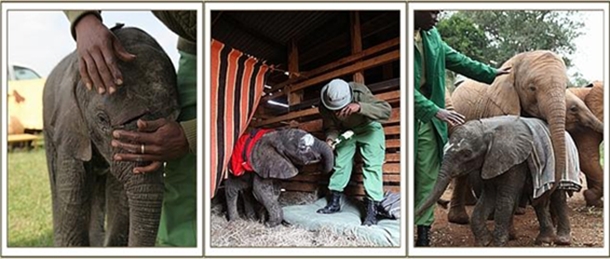 Meet Mumbushi (pictured). He was born in May this year in Mt. Kenya National Park. At the start of July, when he was about seven weeks old, his mother was killed by poachers. He was found by the Hombe River by a cattle herder, who notified the Kenya Wildlife Service who run the Park. They watched the calf until it was clear that his extended family were not going to be able to come back to him. With his strength failing through hunger and a vicious machete wound to his head they captured him and notified the Sheldrick Wildlife Orphanage that another elephant calf was on its way to them.
Meet Mumbushi (pictured). He was born in May this year in Mt. Kenya National Park. At the start of July, when he was about seven weeks old, his mother was killed by poachers. He was found by the Hombe River by a cattle herder, who notified the Kenya Wildlife Service who run the Park. They watched the calf until it was clear that his extended family were not going to be able to come back to him. With his strength failing through hunger and a vicious machete wound to his head they captured him and notified the Sheldrick Wildlife Orphanage that another elephant calf was on its way to them.
Mumbushi spend his first night in captivity in the home of Robert O’Brien, the Senior Warden of the National Park. He cried all night. The next morning the rescue flight from Nairobi arrived for him, bringing specialist rehydratants and milk formula. The deep wound across his face was treated with green clay. He was immediately air lifted back to the orphanage in Nairobi, comforted en route by one of the specialist staff of the Trust.
By lunch time he was back at the nursery. He was given prophylactic antibiotics and had his wound properly checked and treated. After another good feed he was left with his keeper, to start getting to know each other and his new home. The following day he was introduced to the other orphans, who crowded around him and touched him gently with their trucks to welcome him. Rather overwhelmed by all the attention he quickly returned to his keeper. Next day he had the older baby elephants squabbling over who would look after him.
Eventually Shuhuru, a two year old female, won, browsing with Mumbushi and laying her trunk repeatedly on his back to reassure him.
Mumbushi settled well, was loved by the other baby elephants and cared for by experts. Sadly he died on Monday (29th August 2011), of pneumonia, a common ailment in calves trying to survive without their mothers from such a young age. It’s known that 26 elephants have been poached from Mt. Kenya National Park so far in 2011. Make that 27. Mumbushi was a poaching victim too.
What happens to the orphans that do survive? Happily many do survive and are rehabilitated for release back into the wild. We are going to be following a baby elephant and a baby rhino as they follow this path to freedom. We’ll introduce you to them soon and you can follow their progress regularly at Safari Tails.
For more details on the orphans and how to help, visit The Sheldrick Trust